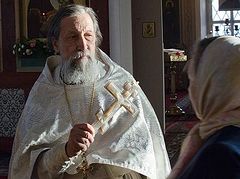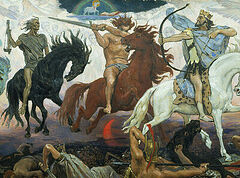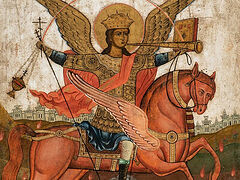Part 1A
Part 1B
Part 2A
Part 2B
Blessed is he that readeth, and they that hear the words of this prophecy
We stopped on the fourth verse of the first chapter. Last time, we talked about it as the Revelation of Jesus Christ, which God gave unto Him, to shew unto His servants things which must shortly come to pass (Rev. 1:1). I repeat that it was written because it will happen this way—it’s not that it will happen this way because it was foretold. All of this is going to happen, thus a prophecy about it was recorded. If we say the opposite, it will seem that God is to blame for all this evil. It was revealed that all these terrible events will come to pass, arranged by people themselves, and they will be responsible for what happens. God knows about it, thus a prophecy was recorded.
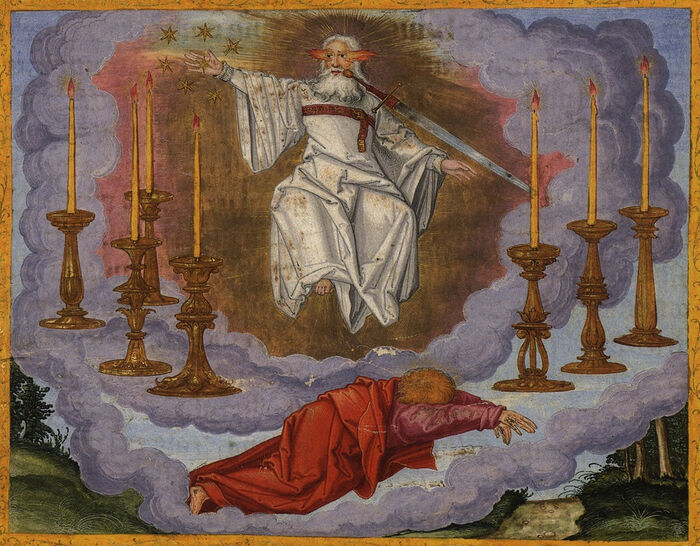 Matthias Gerung, St. John’s Vision of the Seven Lampstands 15th c.
Matthias Gerung, St. John’s Vision of the Seven Lampstands 15th c.
Christ sent the revelation through an angel to His servant the Apostle and Evangelist John, who conveyed the word of God and the testimony of Jesus Christ about what he saw and heard. Blessed is he that readeth, and they that hear the words of this prophecy, and keep those things which are written therein: for the time is at hand (Rev. 1:3). We spoke about how the time is at hand—it’s not in our time dimension, because God is beyond the bounds of our human time and moves in His Divine dimension.
Let’s move on to the fourth verse, where, after the introduction, the Apostle John begins to speak. John to the seven churches which are in Asia: Grace be unto you, and peace, from Him Which is, and Which was, and Which is to come; and from the seven Spirits which are before His throne (Rev. 1:4). These are the churches that were located in Asia Minor. There were other churches then, located in various places. These seven churches, seven spirits, seven eyes—we’ll constantly see this number seven—have a symbolic meaning, which isfullness, like the seven days of creation. This means the words of this prophecy are addressed to the entire Church in all ages. The Apostle John says that he prays that God will grant His grace and peace; God Which is, and Which was, and Which is to come.
And then you’ll notice, especially philologists, that he changes the order of words. Instead of saying, “who was, who is, and who is coming,” the Apostle changes the order, although he knew Greek very well, and says: Which is, and Which was, and Which is to come, referring to God. The Apostle prays that grace and peace from God might descend upon Christians. Grace is the deliverance that God gave the world. When we in the Church say “grace,” we understand this word to mean energy, the uncreated energy of God, which is poured out on man and saves him. Man is delivered by the grace of God—we can interpret it this way. Man is liberated for free. Our salvation was given to us for free; we didn’t offer anything. Christ saved us gratuitously. And may this grace of our deliverance, and the energy of the Holy Spirit, and the peace of God be with us all.
Peace is a consequence of the coming of grace. When grace abides in a man, that man becomes peaceful. There’s no peace without grace. Wherever you see confusion, irritation, shouting, screaming, nerves, disorder, there’s no grace there. Grace can’t abide where there’s no peace. God makes His abode in a peaceful man. God doesn’t dwell in an anxious, restless, angry, nervous, gloomy, and confused man. God is the God of peace and He dwells in peace. God reveals Himself in peace and through people who have peace within themselves. When grace comes, its first manifestation is peace, and therefore Christ constantly says: Peace be unto you. When His Disciples met Him, He said: Peace be unto you. When God is present, we feel peace first. When God is absent and the energy of satan is at work, then we feel inner turmoil. The soul is in turmoil, there’s no peace in it, and we can’t be comforted by anything. Where there is confusion and dismay, there is no God. I won’t dwell on this any longer, but I’ll try to go further through the text, because it’s rather long. I think it’ll be interesting for you to see what’s described next.
Grace be unto you, and peace, from Him Which is, and Which was, and Which is to come (Rev. 1:4), says the Apostle. He Who exists, Who existed, and Who is coming. This is a reminder of the Triunity of God. “Which is”—this reminds us of God in the Old Testament. In Exodus 3:14, God speaks with Moses. After He sent him to lead the people out of Egypt, Moses asked God about how he should answer the sons of Israel if they ask about His name. I shall say unto them, The God of your fathers hath sent me unto you; and they shall say to me, What is His name? what shall I say unto them? (Ex. 3:13). God answered Moses: I AM THAT I AM [He Who Is/The Existing One] (3:14).
In Hebrew, this name is written with the four characters אֶהְיֶה. The Jews never pronounced this name, so we don’t know how exactly the name of God was pronounced—probably “Yahweh.” Today there are the Jehovah’s Witnesses—chiliasts, heretics, who constantly pronounce this name, which is just one of the names of God. In the Old Testament, God was called by various names: Adonai, Elohim, Sabaoth. Yahweh is one of these names. However, when the Jews, saw this name in the Old Testament, they never read it aloud, because they revered and feared pronouncing the name of God. When they saw these letters, they would instead say Sabaoth, Elohim—one of the other names. When this name was translated into Greek (seventy wise Jewish translators of the Old Testament translated it from Hebrew 200 years before the coming of Christ; it wasn’t us Christians who translated the Old Testament), they translated these four characters (tetragrammaton) as “ο Ων, ο Υπάρχων” [the Being, He Who Is]. Here, the Apostle and Evangelist John, using this translation of the seventy, imprinted the name of God, reminding us that this is the same God of the Old Testament, the Existing One.
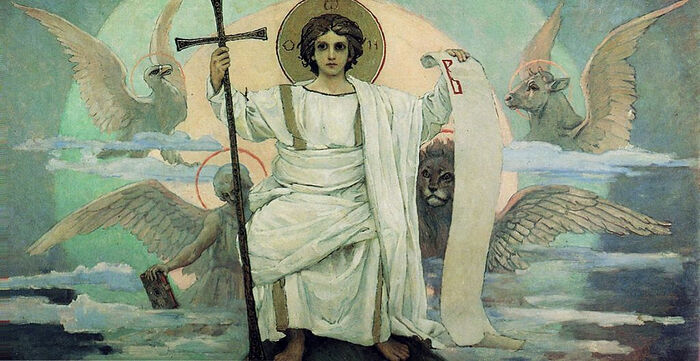 The Only-Begotten Son, sketch of Viktor Vasnetsov for St. Vladimir’s Cathedral in Kiev
The Only-Begotten Son, sketch of Viktor Vasnetsov for St. Vladimir’s Cathedral in Kiev
Further: Him Which is. The same verb is used here as in the New Testament when it says: In the beginning was the Word, and the Word was with God, and the Word was God (Jn. 1:1, in Greek, the same verb ήν—was). And Which is to come refers to the Holy Spirit. We can say that all of this refers to the Triunity of God. But we can also say that all of this—“is and was and is coming”—refers to God as a whole, because the Trinitarian properties are common to all Persons.
So, Grace be unto you, and peace, from Him Which is, and Which was, and Which is to come (from the Father); and from the seven Spirits Which are before His throne (from the Holy Spirit). Before, we were talking about seven Churches, and here we’re talking about seven spirits. This is the grace of the Holy Spirit. It’s not seven holy spirits, but the properties of the Holy Spirit. The Prophet Isaiah mentions the seven properties of the Holy Spirit—the spirit of wisdom, the spirit of reason, the spirit of strength, and all the rest. He mentions the seven properties of the Holy Spirit in order to show the fullness of the gifts of the Holy Spirit, found before His throne; that is, we have grace and peace from the Holy Spirit. And then he says: And from Jesus Christ. You see, we have a clear reference to the Holy Trinity: God the Father, the Holy Spirit, and Jesus Christ. Jehovah’s false Witnesses, the chiliasts, say the Holy Trinity is never mentioned in Scripture, but we see many places where the Holy Trinity is clearly spoken of, to the assurance of the Church.
Verse five says: And from Jesus Christ, Who is the faithful witness, and the first begotten of the dead, and the Prince of the kings of the earth. Unto Him that loved us, and washed us from our sins in His own Blood (Rev. 1:5). Christ is a faithful witness; He testified to the truth before us. He revealed the truth about God to us, the truth about the Holy Trinity, the truth about the salvation of man through Himself. Christ is a faithful witness and the firstborn of the dead—He Who first rose from the dead and through Whom all the other dead will rise. This reveals the faith of the Church that all the dead will rise; there will not be a single man who won’t rise. When Christ comes in the Second Coming, we’ll all be resurrected. Everyone. No matter who we are, no matter where we live, no matter how we die—we’ll all resurrect, without exception. It’s not our soul that will be resurrected, because souls don’t die—our bodies will be resurrected. The body that we have now will be resurrected. Of course, it won’t resurrect as in old age or as a baby, sick or with disabilities. It will be perfect, unharmed, without disease or injury. As Christ resurrected whole and unharmed, so we will all rise in Christ Jesus, in the firstborn from the dead. Therefore, we Christians don’t believe in the transmigration of souls.
If we believed in the transmigration of souls, then how could the dead be resurrected? If I’m resurrected, then in what body? In the one I have now, or in the one I lived in fifty, 100, or 200 years ago? Then the uniqueness of the human personality would be lost. Man isn’t repeated, we don’t come into this world twice, and we didn’t exist earlier (we didn’t “pre-exist”). We appeared at the moment of our conception. When we were conceived within the womb of our mother, that’s when our soul was created. Our soul didn’t exist before, and it won’t live in some other body later. All these teachings are heretical; the Church rejected them because we believe in the resurrection from the dead through Jesus Christ, Who is the Prince of the kings of the earth. Christ is over everyone. There’s no one higher than Christ. There’s nothing that brings Christ down. Christ is above everyone and everything.
And those who are with Christ are also found to be above everyone and everything. Then it says that Christ is the Lord of the kings of the earth, Who loves us and Who washed us from our sins by His Blood. Just as we wash a dirty, stained child covered in filth, so Christ washed and cleansed us from our sins. How? By His Blood. Therefore, my brothers, when we go to the Divine Liturgy, we go mainly to partake of the Body and Blood of Christ unto the remission of sins and life eternal. Of course, having prepared appropriately, we approach the chalice to become partakers of this great event—our purification. Christ was crucified and saved the entire world; He saved all of mankind by His All-Holy Blood. And every one of us participates in our personal salvation, which Christ brought to earth and gave us by His Cross; participating in the Sacrament and communing with Christ, Who cleansed us from our sins.

